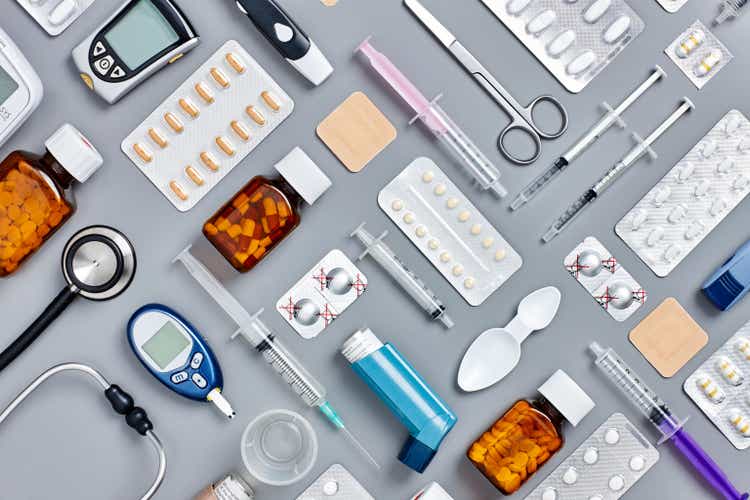
Neustockimages
In my personal investments and investments made for Freedom Mountain Investment clients I have consistently preferred Medical Device companies vs. pharmaceutical companies. This preference was based upon my perception of long-term total performance. I have also heard this opinion expressed by other experienced long-term investors.
To test this preference I recently completed an analysis of the top ten Pharma companies (sorted by market capitalization) vs. the top ten Medical Device companies. The Pharma companies analyzed were Eli Lilly (LLY), Pfizer (PFE), Roche (OTCQX:RHHBY), Novo Nordisk (NVO), AbbVie (ABBV), Merck (MRK), Novartis (NVS), Bristol Myers (BMY), AstraZeneca (AZN) and Amgen (AMGN). The Medical Device companies were Abbot (ABT), Medtronic (MDT), Intuitive Surgical (ISRG), Stryker (SYK), Becton, Dickinson (BDX), Edwards Lifesciences (EW), Boston Scientific (BSX), Terumo (OTCPK:TRUMF, Japan), Zimmer Biomet (ZBH) and Align (ALGN). I excluded Johnson & Johnson from the analysis since this company has important businesses in pharmaceuticals, medical device and consumer products. I also exclude the Chinese company WuXi which has both pharma and medical device segments. Mindray and Alcon were excluded due to insignificant stock price history/information. In the case of Abbott which spun off AbbVie in January 2013, I used the date of the spin off as the starting point for stock price history for both companies. I excluded Baxter (BAX) since it had important therapeutic products for a sizable portion of the ten year time period. Danaher (DHR) is sometimes included in lists of large Medical Device companies but I excluded it since its businesses do not fit a traditional Med Device definition and it also has non-health care business segments.
The results of the analysis supported my hypothesis that Medical Device companies tend to be superior investments vs. Pharma. The Med Device companies had a total average stock return (including dividends) of 15.7% vs. 13.7% for the Pharma companies. The top performers in the Medical Device section were Edwards, Align, and Boston Scientific., all with total annual returns exceeding 20%. The Japanese company Terumo was the worst performing med device company with negligible total returns over the ten years. Substituting Danaher for Terumo would have bumped up the total average med device performance by about 2%. Lilly was the best performer in Pharma, the only one with a total return in excess of 20%. For investors looking for dividend income and willing to sacrifice some total return, Pharma companies may be the better choice. The average dividend of the Pharma companies was 2.7% vs. 0.83% for the Med Device companies analyzed.
Explaining the Outperformance
There are a number of reasons that I would point to for the outperformance of the med device companies. Pharma is in many ways a more difficult business. The patent cliff that occurs when a blockbuster product loses protection is a very big business killer. Pharma companies that have billion dollar plus franchises in a particular therapeutic area can see these businesses go to zero in just a few years. Their investment in that therapeutic area e.g. concentrated sales force, established relationships with patients and thought leaders can be quickly lost. The discovery of important new therapeutics is a very expensive and high risk endeavor. In contrast medical device companies can often tweak a product in the case of patent expiration. That allows them to continue to profit from the same health areas (e.g. joint replacement, surgical products etc.) for many more years. While all of healthcare is subject to lawsuits, pharmaceuticals have a history of larger negative outcomes coming out of litigation in my view. Price regulation may be a larger issue for Pharma going forward.
The analysis may be somewhat affected by the significantly larger size of the Pharma companies. The average market cap of the Pharma companies was in excess of $200B more than twice the average market cap of the medical device companies. It is often said that growing a large company is more difficult than growing a small one. Three of the stars in the medical device arena (EW, ALGN and ISRG) are companies with strongly innovative products that were in an early phase a decade ago.
Investment Conclusions
Of the Pharma companies mentioned I only own shares in Amgen (AMGN) and Roche (OTCQX:RHHBY). The latter is a very small position which has not done particularly well. I hold large positions in my personal accounts and also in accounts managed for Freedom Mountain Investment clients in Abbott (ABT), Stryker (SYK), Becton, Dickinson (BDX) and Edwards Lifesciences (EW). I also hold large positions in Danaher (DHR) in personal and managed accounts. I am seeking superior total returns in these investment choices with dividends not being a priority.


Be the first to comment